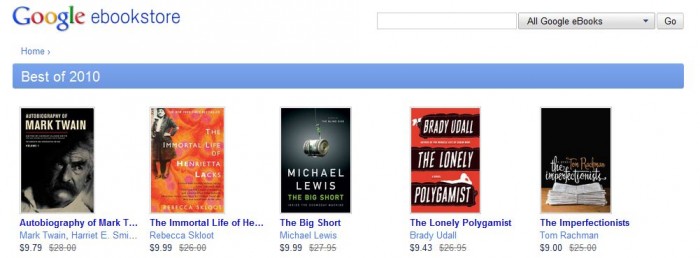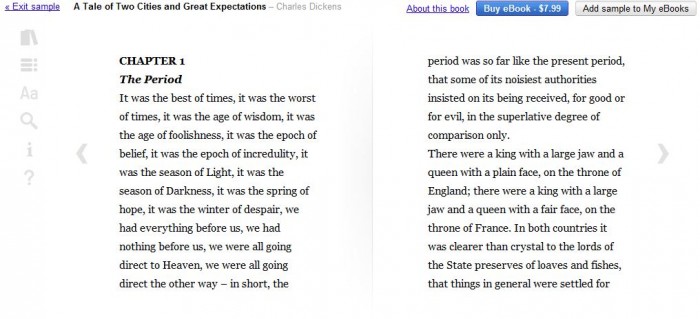
Google eBooks are here! They’ve been rumored for months, and everyone’s been expecting great things. Are they the best thing since sliced bread, or are they just another me-too offering? Let’s look at the good and the bad, and what it might take to really make an impact in today’s ebook market.

The Good:
-Digital rights management: While it’s disappointing that DRM is still necessary, at least Google is using Adobe Digital Editions (ADE). This is the same quasi-universal standard supported by the Aluratek Libre, the Kobo Readers, Sony Readers, even the NOOK. In fact, the only major device that doesn’t support it is the Kindle. Basically, it opens up a big hardware world for Google.
-iOS and Android apps: Dedicated apps right out of the gate are a must, especially when you can hit tablets and smartphones simultaneously. I can’t comment on the iOS version, but for Android, this is definitely split, and you’ll have to look in “The Bad” for more.
-Involvement of smaller bookstores: Google eBooks is going to be powering smaller bookstore eBookstores, so every bookseller out there with a website can sell ebooks. More retailers is definitely a good thing!
-Online reading: I put this in more of a mixed bag category, but even browser-based reading is better than locking the books away unless accessed by a smartphone or ebook reader. And it doesn’t require installing a desktop app, making it flexible and multiple-device friendly.
-Wireless sync: Syncing across multiple apps/websites is pretty much necessary. It would be a huge embarrassment for Google, leader of the internets if Kobo, B&N, and Amazon could all pull off such a simple sync feature and Google couldn’t.

The Bad:
-Android app: It’s really, really mediocre. It doesn’t offer the ability to change background colors (only night/day), there’s no landscape reading ability, and you can’t highlight or bookmark. The user interface is fairly boring. There’s nothing remotely special about it, and it doesn’t even offer the same basic features that the Kindle and NOOK apps offer with respect to highlighting.
-Questionable advertising: “3 MILLION TITLES” sounds really exciting, and like Google has done something special. The reality is that most of those titles are the public domain ones Google has scanned. On a mainstream, commercial book basis I’d say Google probably has the same number of titles as B&N, Amazon and possibly Kobo. They’re just fluffing up their numbers to look better, and while that’s totally fine, don’t get suckered into thinking there’s something special here. If your favorite (current) author isn’t supporting ebooks, they aren’t going to show up on Google eBooks and not in Amazon or B&N.
-Boring: There’s absolutely nothing special about Google eBooks. It’s just like any other eBookstore (and thanks to the magic of agency pricing, it’s not even cheaper!) Worst of all, it’s actually LACKING in features compared to Amazon and B&N. You can’t highlight or take notes, and you can’t even BOOKMARK. It’s just a big yawner. Very disappointing, especially coming from Google, a company with the brain and fiscal power to actually innovate…but they didn’t.
So what could shake up the ebook market?
What disappoints me is that Google could have done more. Why can’t you send a buzz sharing your favorite portion of a book? Or highlight and sync notes to Google docs? Better yet, why not work out a discount on a Google Edition of the NY Times if I follow their RSS feed through Google Reader? There are dozens of ways to connect ebooks to other Google services, and it just isn’t happening.
Or, here’s a really big way to shake things up: Why couldn’t Google fight for no DRM on some books? If Google had been able to sell major titles DRM-free, available in ePUB and Kindle formats, that would have sent shockwaves through the industry. All it would take is one publisher giving it a try, and with how frightened they all are of Amazon’s marketshare Google would have had some leverage to ask for change. Instead, we get another me-too offering, one that doesn’t offer a compelling reason to switch from existing buying patterns. I’d love to believe Google has something big up their sleeves, but between delays and a general lack of serious enthusiasm, I think this is more of a “let’s a get a foothold just in case” hobby then a serious attempt to hone in on a new market.
Clearly, I’m really unimpressed so far. I’ve used Kobo, eReader, B&N, Amazon, FBReader, Aldiko, Stanza, etc…basically every major and not so major ebook reader and store. There’s nothing that makes me want to break from the stores I already like to give Google a try, especially since it means I’d have to take a giant step backward in features. What do you think of Google Editions? Am I being too harsh in leaving this one on the shelf?

I’m sure that the publishers of books don’t give a crap if you are Apple, Amazon or Google – they are *not* going to offer DRM free books for current titles for a long, long time. Music titles – even albums – consume a small portion of time and are listened to over and over, and, obviously, are easy to pirate and the DRM cat was out of the bag long before they tried to sell protected titles. The effort to make and get DRM-free versions is relatively trivial. Unlike music, almost every book is read exactly once – only a relative handful are read multiple times, and each reading consumes a large portion of time. A title’s exclusiveness and protection is far more valuable to a book’s rights holder than it is for a music holder. Also, it’s a bear to pirate a book – it’s a lot of effort for something you’ll likely only use once yourself.
I’m a big fan of delivering the imperfect so long as you are committed to getting it right in a series of quick steps. If Google waited until their store and ereader software was perfect they would have lost months of new users coming to ebooks for the first time. I’ll stick with the Kindle app for now, but I’ll try a Google book if the price is right, for sure.
Is Google eBooks a Bestseller or a Bargain Bin Book? | Gear Diary: Google eBooks are here! They've been rumored … http://bit.ly/hOK2kH
I would say that the iOS app is also very mediocre with the same feature set and limitations you mention above.
That said, Google not only has it’s large library of public domain titles, but also a lot of titles that other book stores don’t offer, especially in non-fiction areas – something sadly semi-neglected by the other big players in favor of keeping up with the NYT bestseller lists. You would think this would be a good thing – and it is – except they scanned and added these books in to their library in the past (and settled a lawsuit by agreeing to charge for the scanned versions because they are not public domain), but they are flat scans – in other words the pages are images, not actual text. Worse – they were done at a low enough resolution that books with small print can be close to unreadable at times. So you pay for a book that is difficult – sometimes impossible to read. I purchased one instructional book in which the tables in the book (giving examples of the topic being discussed) are all completely missing from the text – a thing not disclosed in the product description!
To be fair – on the purchase page for these titles, Google does warn you that it is a scanned book and you might want to download a sample before buying. They also suggest viewing only on a larger device (which doesn’t help, of course, it just gives you a bigger, grainy image!).
So I must agree – Google Books is kind of a mediocre offering – some good, some bad. Either way, it really hasn’t lived up to the hype for me yet. Oh – and I reported the worts of the “bad” scanned books to them (that I came across) and they haven’t really done anything to remediate the situation for me yet. Kind of disappointing, but not really a surprise. Google isn’t known for quick customer service on ANY of their service offerings.